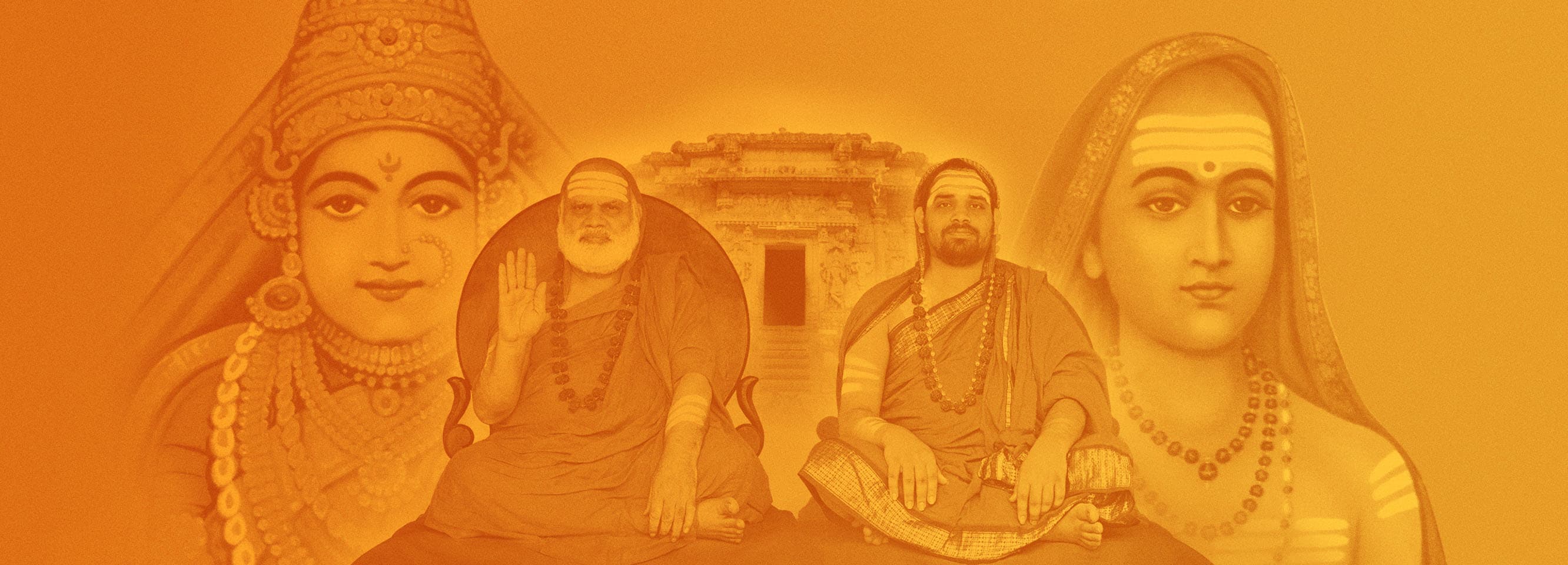अविद्यारण्यकान्तारे भ्रमतां प्राणिनां सदा । विद्यामार्गोपदेष्टारं विद्यारण्यगुरुं श्रये ॥ To souls that wander in utter dismay in the dense woods of mental ignorance, He shows the path of true wisdom; Homage to the great Saint Vidyaranya!
The Illustrious Twelfth Acharya
Five centuries after the divine advent of Sri Shankara Bhagavatpada, Sri Vidyaranya ascended the sacred Sringeri Sharada Peetham as its twelfth Jagadguru Shankaracharya. Though He graced the Vyakhyana Simhasana for a relatively brief period from 1380 to 1386 A.D., His visionary leadership and incomparable contributions to Vedantic philosophy brought unparalleled glory to the Math and transformed the spiritual landscape of India.
Transformation of Sringeri
Under Sri Vidyaranya's extraordinary guidance, Sringeri underwent a remarkable metamorphosis while simultaneously witnessing the birth of a great empire. What had been a peaceful collection of hermitages blossomed into a magnificent spiritual empire vested with both religious and temporal authority. The Vyakhyana Simhasana—the Throne of Transcendental Wisdom—at the Sharada Peetham became the seat of administrative governance over the newly established Samsthanam, while His visionary counsel gave rise to the Vijayanagar Empire itself.
This unique synthesis of the sacred and the secular, manifested both at Sringeri and in the founding of Hampi as the empire's capital, ignited a powerful renaissance of cultural pride and spiritual unity throughout southern India. His strategic genius in establishing Vijayanagar as a bulwark against invasive forces while nurturing it as a center of learning and devotion awakened a renewed sense of dharmic identity that would resonate for centuries.
Founder of Vijayangar Empire and Sacred City of Hampi
Jagadguru Sri Sri Vidyaranya Mahaswamiji stands as the supreme architect of both spiritual renaissance and political resurgence in medieval India. His visionary genius gave birth to the mighty Vijayanagar Empire—a Hindu kingdom that would stand as Dharma's shield against foreign invasions for over three centuries. As the spiritual mentor and guiding force behind the empire's founders, Harihara and Bukka, He transformed a strategic vision into historical reality.
At Hampi, on the banks of the sacred Tungabhadra, Sri Vidyaranya established what would become the jewel of the Vijayanagar Empire. This was no mere act of city planning but a profound spiritual undertaking—the creation of a sacred metropolis where temporal power would serve eternal dharma. The magnificent temples He constructed at both Sringeri and Hampi stand as enduring testimony to His architectural vision, while the numerous Maths He founded across the subcontinent created an extensive network for disseminating Vedanta's eternal wisdom.
His role transcended that of a spiritual advisor; He was the empire's true architect, weaving together political strategy, economic prosperity, and cultural flowering into a unified vision of dharmic governance. Under His guidance, Vijayanagar became not merely a kingdom but a civilization—a beacon of Hindu renaissance that attracted scholars, artists, and devotees from across the known world.
Yet His greatness transcended even these monumental achievements. He embodied a rare combination of spiritual realization, political acumen, and scholarly excellence. As a writer and philosopher, His works occupy an exalted position in the treasury of post-Shankara Advaitic literature. His profound interpretative genius enabled Him to resolve apparent contradictions across various philosophical texts, revealing the underlying unity that pervades all authentic Vedantic teachings.
Unparalleled Literary Contributions
While Sri Adi Shankaracharya remains unsurpassed in establishing and disseminating the fundamental truths of Advaita Vedanta, Sri Vidyaranya distinguishes Himself among subsequent Acharyas through the remarkable depth, breadth, and accessibility of His scholarly works. His writings demonstrate an extraordinary ability to make the most profound philosophical insights comprehensible to sincere seekers while maintaining rigorous intellectual precision.
Among His numerous invaluable contributions to Vedantic literature, two masterworks shine with particular brilliance—the Panchadasi and the Jivanmukti Viveka. These luminous treatises, crafted respectively for spiritual aspirants and accomplished renunciates, have earned universal acclaim for their crystalline clarity of exposition and their rich treasury of authoritative scriptural quotations. Through these works, the most subtle truths of Advaita become accessible to dedicated students while offering profound insights for advanced practitioners on the path of liberation.
The enduring influence of these texts continues to guide countless seekers across the centuries, transforming the bewildering forest of spiritual ignorance into a clear pathway illuminated by the radiant light of self-knowledge.


